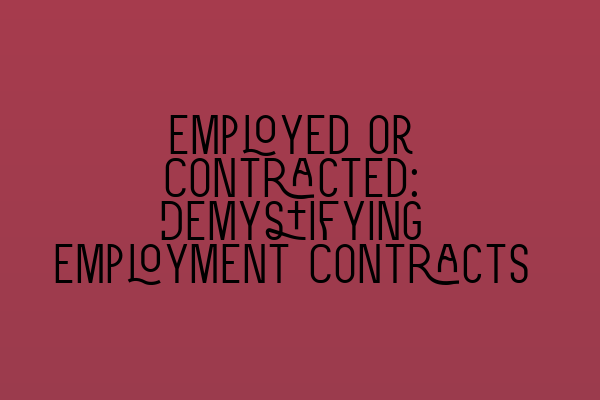Employed or Contracted: Demystifying Employment Contracts
One of the crucial decisions individuals face in their professional lives is whether to be employed or contracted. Employment contracts and contractor agreements have their own advantages and considerations. Understanding the differences between the two can help individuals make informed choices that align with their career goals and personal circumstances.
Employment Contracts: A Closer Look
An employment contract is a legally binding agreement between an employer and an employee. It outlines the terms and conditions of the employment relationship, including job responsibilities, working hours, compensation, benefits, and other relevant provisions.
Employment contracts often provide individuals with stable employment, as they typically come with a minimum notice period and statutory protections such as unfair dismissal rights. Additionally, employees may be entitled to various benefits, including paid leave, pension contributions, and healthcare coverage.
However, it’s important to note that employment contracts also come with certain obligations. Employees are expected to comply with company policies, follow instructions, and act in the best interests of the employer. They may also face restrictions on working for competing businesses during and after their employment.
Contractor Agreements: An Overview
A contractor agreement, on the other hand, is a contract between a contractor and a client. Contractors are considered self-employed or freelancers, providing services on a project or assignment basis. This type of agreement allows individuals to work for multiple clients simultaneously, offering flexibility and autonomy.
Contractor agreements typically outline the scope of work, deliverables, payment terms, and the timeline for completion. Unlike employment contracts, contractors are responsible for their own taxes, insurance, and benefits. They have the freedom to set their own rates and negotiate terms with clients.
Contractors also have the advantage of being able to choose the projects they work on and have more control over their work-life balance. However, contracting can come with uncertainties, such as fluctuations in workload and income, as well as a lack of job security and certain employment-related benefits.
Factors to Consider
When deciding between employment and contracting, several factors should be taken into account:
- Financial Considerations: Evaluate the financial implications of each option, considering factors such as taxes, benefits, and ongoing expenses.
- Job Security: Assess whether stability or flexibility is more important to you at this stage of your career.
- Personal Preferences: Consider your work style, desired level of independence, and long-term career goals.
- Legal Protections: Understand the legal rights and responsibilities associated with each type of contract, including notice periods, termination rights, and potential liabilities.
Ultimately, there is no one-size-fits-all answer when it comes to choosing between employment and contracting. It heavily depends on your specific circumstances and future aspirations.
Seeking Legal Advice
If you’re unsure which option is best for you, it’s recommended to seek legal advice from a qualified contract law solicitor. They can provide expert guidance based on your individual situation and help you navigate the legal complexities involved.
At SQE Contract Law, our team of experienced solicitors specializes in contract law and can provide the support and advice you need. Contact us today to schedule a consultation.
Related Articles:
- Exploring the Impact of Frustration on Contractual Obligations: Legal Insights
- Interpreting Contractual Clauses: Unlocking the Hidden Meanings
- Legal Aspects of Business Contracts: Key Considerations for Entrepreneurs
- SQE Contract Law vs. Traditional Qualifications: A Comparative Analysis
- Agreements in Contract Law: Understanding Its Various Types
